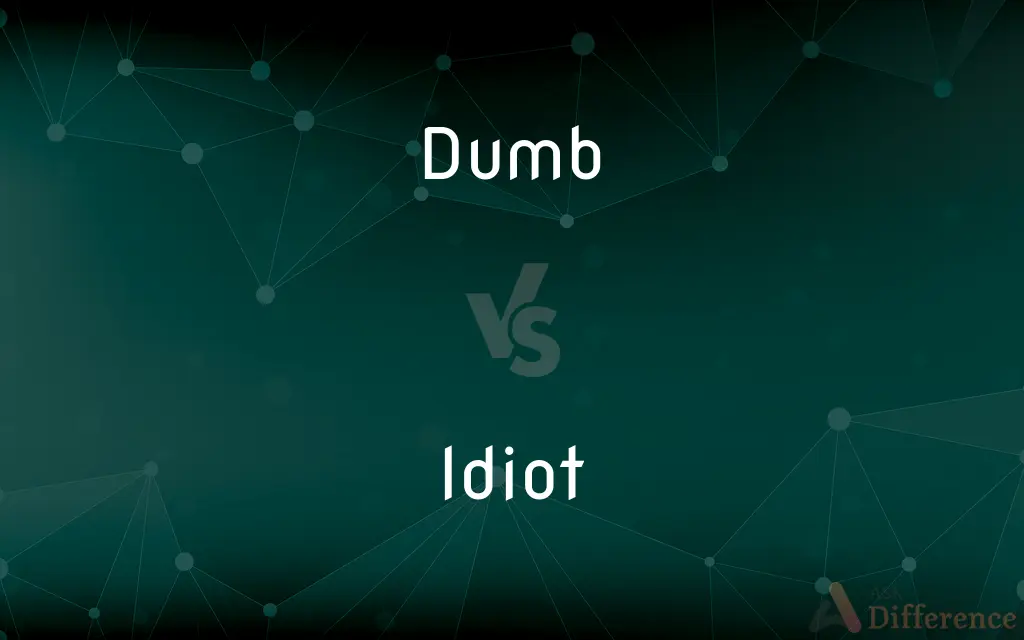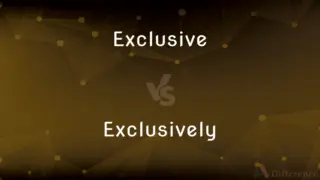Dumb vs. Idiot — What's the Difference?
Edited by Tayyaba Rehman — By Fiza Rafique — Updated on March 15, 2024
Dumb originally referred to muteness, the inability to speak, while idiot historically described someone with profound intellectual disability.

Difference Between Dumb and Idiot
Table of Contents
ADVERTISEMENT
Key Differences
"Dumb" was initially used to denote someone who was mute or unable to speak. Over time, its usage has evolved and can be considered offensive when used to insult someone's intelligence. On the other hand, "idiot" is a term that was historically used to describe individuals with a very low level of intellectual functioning, specifically someone with a mental age below three years, and incapable of guarding themselves against common physical dangers. Like "dumb," its usage today as an insult is derogatory and offensive.
The term "dumb" can also imply a temporary inability or unwillingness to speak in a particular situation, reflecting a choice or condition rather than a permanent state. In contrast, "idiot" has been used in a more fixed sense, referring to a person's perceived permanent state of intellectual disability. However, both terms have largely fallen out of favor in medical or educational contexts due to their pejorative connotations and are considered disrespectful.
In modern vernacular, "dumb" is often used colloquially to criticize a lack of judgment or wisdom in specific situations, rather than an overall assessment of one's intelligence. "Idiot," while also used to question someone's judgment or intelligence, typically carries a stronger connotation, suggesting a more significant or fundamental lack of understanding or capability.
It's important to note the evolution of language and the impact of words. Both "dumb" and "idiot" serve as examples of how language can evolve and how sensitivity to the implications of certain words becomes more pronounced over time. The use of these terms in any context other than historical or linguistic discussion is generally considered disrespectful and is discouraged.
Despite their different origins, the common use of "dumb" and "idiot" today in casual speech tends to blur the distinctions between them, with both terms being used interchangeably to criticize intelligence or decision-making. This shift underscores the fluid nature of language but also highlights the importance of considering the impact of our words on others.
ADVERTISEMENT
Comparison Chart
Original Meaning
Refers to muteness, the inability to speak.
Describes profound intellectual disability.
Modern Usage
Used to imply a lack of judgment or wisdom.
Implies a significant lack of intelligence.
Connotation
Can be offensive; often seen as less severe than "idiot".
Stronger, more derogatory connotation than "dumb".
Context
Can imply temporary inability or choice not to speak.
Suggests a more fixed, inherent lack of understanding.
Acceptability
Considered disrespectful when used to insult.
Also considered derogatory and offensive.
Compare with Definitions
Dumb
Can suggest a momentary lapse in judgment.
I can't believe I was dumb enough to forget my keys.
Idiot
Historically classified severe intellectual disability.
The term idiot was once a medical diagnosis.
Dumb
Sometimes used to describe inanimate objects or ideas.
That's a dumb rule that serves no purpose.
Idiot
Now, a derogatory term implying profound ignorance or stupidity.
Using idiot as an insult is harmful and unnecessary.
Dumb
Now colloquially used to question someone's decision-making.
It was a dumb decision to leave the house unlocked.
Idiot
Offensive when used to demean someone.
Resorting to calling someone an idiot during an argument is low.
Dumb
Its use as an insult is considered offensive.
Calling someone dumb for a mistake is disrespectful.
Idiot
Indicates a significant lack of intelligence or common sense.
Driving recklessly is an idiotic thing to do.
Dumb
Originally meant unable to speak.
In historical texts, dumb was used to describe muteness.
Idiot
Rarely used in a literal medical sense today.
Medical professionals no longer use idiot in diagnoses.
Dumb
Lacking the power of speech. Used of animals and inanimate objects.
Idiot
An idiot, in modern use, is a stupid or foolish person. 'Idiot' was formerly a technical term in legal and psychiatric contexts for some kinds of profound intellectual disability where the mental age is two years or less, and the person cannot guard themself against common physical dangers.
Dumb
(Offensive) Incapable of using speech; mute. Used of humans. See Usage Note at mute.
Idiot
A stupid person.
Dumb
Temporarily speechless, as with shock or fear
I was dumb with disbelief.
Idiot
A person who is considered foolish or stupid.
Dumb
Unwilling to speak; taciturn.
Idiot
A person with profound intellectual disability having a mental age below three years and generally unable to learn connected speech or guard against common dangers. The term belongs to a classification system no longer in use and is now considered offensive.
Dumb
Not expressed or articulated in sounds or words
Dumb resentment.
Idiot
(pejorative) A person of low general intelligence.
Dumb
(Nautical) Not self-propelling.
Idiot
(pejorative) A person who makes stupid decisions; a fool.
We think that people who cycle without a helmet are idiots.
Dumb
Conspicuously unintelligent; stupid
Dumb officials.
A dumb decision.
Idiot
A person of the lowest intellectual standing, a person who lacks the capacity to develop beyond the mental age of a normal four-year-old; a person with an IQ below 30.
Dumb
Unintentional; haphazard
Dumb luck.
Idiot
(uncommon) idiotic, stupid
Dumb
To make silent or dumb.
Idiot
A man in private station, as distinguished from one holding a public office.
St. Austin affirmed that the plain places of Scripture are sufficient to all laics, and all idiots or private persons.
Dumb
(dated) Unable to speak; lacking power of speech (kept in "deaf, dumb, and blind").
His younger brother was born dumb, and communicated with sign language.
Idiot
A fool; a simpleton; - a term of reproach.
Weenest thou make an idiot of our dame?
Dumb
(dated) Silent; unaccompanied by words.
Dumb show
Idiot
A person of subnormal intelligence
Dumb
Extremely stupid.
You are so dumb! You don't even know how to make toast!
Dumb
(figuratively) Pointless, foolish, lacking intellectual content or value.
This is dumb! We're driving in circles! We should have asked for directions an hour ago!
Brendan had the dumb job of moving boxes from one conveyor belt to another.
Dumb
Lacking brightness or clearness, as a colour.
Dumb
To silence.
Dumb
(transitive) To make stupid.
Dumb
(transitive) To represent as stupid.
Dumb
(transitive) To reduce the intellectual demands of.
Dumb
Destitute of the power of speech; unable; to utter articulate sounds; as, the dumb brutes.
To unloose the very tongues even of dumb creatures.
Dumb
Not willing to speak; mute; silent; not speaking; not accompanied by words; as, dumb show.
This spirit, dumb to us, will speak to him.
To pierce into the dumb past.
Dumb
Lacking brightness or clearness, as a color.
Her stern was painted of a dumb white or dun color.
Dumb
To put to silence.
Dumb
Slow to learn or understand; lacking intellectual acuity;
So dense he never understands anything I say to him
Never met anyone quite so dim
Although dull at classical learning, at mathematics he was uncommonly quick
Dumb officials make some really dumb decisions
He was either normally stupid or being deliberately obtuse
Worked with the slow students
Dumb
Unable to speak temporarily;
Struck dumb
Speechless with shock
Dumb
Lacking the power of human speech;
Dumb animals
Dumb
Unable to speak because of hereditary deafness
Common Curiosities
Can "dumb" still refer to muteness?
While its historical meaning refers to muteness, using "dumb" in this context is outdated and potentially offensive.
What has replaced the term "idiot" in medical or educational contexts?
Modern terminology uses specific diagnoses or descriptions of intellectual disability, focusing on respect and accuracy.
Why is the use of "dumb" and "idiot" discouraged?
Both terms are considered offensive and disrespectful, particularly when used to insult someone's intelligence or abilities.
How have the meanings of "dumb" and "idiot" evolved over time?
Both terms have shifted from specific medical or descriptive uses to more generalized, derogatory terms used to insult intelligence or decision-making.
Is it more offensive to call someone "dumb" or an "idiot"?
While both are offensive, "idiot" typically carries a stronger, more derogatory connotation.
Are there alternatives to using "dumb" or "idiot" when criticizing actions?
Yes, focusing on specific behaviors or decisions without attacking personal intelligence is a more constructive approach.
Is there any context where using "dumb" or "idiot" is acceptable?
While their usage in historical or linguistic discussion might be informative, using these terms to describe people is generally considered disrespectful.
What impact does calling someone "dumb" or an "idiot" have?
Beyond being disrespectful, it can reinforce negative self-perceptions and contribute to a harmful environment.
How does society view the use of terms like "dumb" and "idiot"?
There's growing awareness and sensitivity towards the negative impact of such terms, leading to a broader understanding of their offensiveness.
How do historical uses of "dumb" and "idiot" inform our understanding of language evolution?
They exemplify how terms can shift in meaning and sensitivity over time, reflecting changes in societal values and knowledge.
Share Your Discovery

Previous Comparison
Exclusive vs. Exclusively
Next Comparison
Diploma vs. SheepskinAuthor Spotlight
Written by
Fiza RafiqueFiza Rafique is a skilled content writer at AskDifference.com, where she meticulously refines and enhances written pieces. Drawing from her vast editorial expertise, Fiza ensures clarity, accuracy, and precision in every article. Passionate about language, she continually seeks to elevate the quality of content for readers worldwide.
Edited by
Tayyaba RehmanTayyaba Rehman is a distinguished writer, currently serving as a primary contributor to askdifference.com. As a researcher in semantics and etymology, Tayyaba's passion for the complexity of languages and their distinctions has found a perfect home on the platform. Tayyaba delves into the intricacies of language, distinguishing between commonly confused words and phrases, thereby providing clarity for readers worldwide.














































